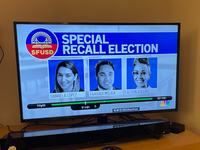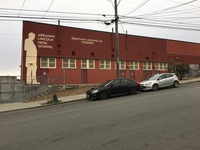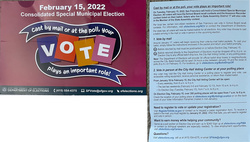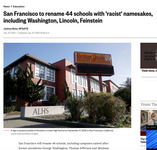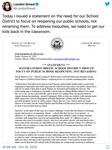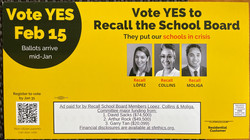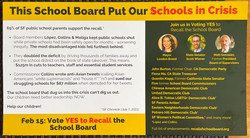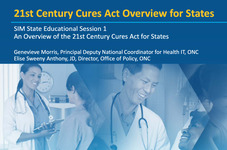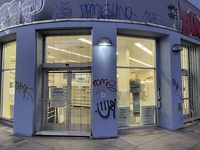 |
| Angelika/Mike Schilli |
|
|
|
Angelika It is evident that tensions are rising in San Francisco and that citizens are becoming increasingly frustrated, as seen by the growing number of initiated recall procedures from political offices. I have already reported on the recall procedure against District Attorney Chesa Boudin (Rundbrief 11/2021). Last week, a brochure landed in our mailbox informing us about the next recall in San Francisco: This time, 3 out of 7 "School Board members" are up. What exactly is a "School Board"? Even translating the expression into German is not so straightforward.
The translation "committee" of a public school district probably come closest to the concept. School policy in the US is very decentralized, even more so than in Germany. Although certain requirements of the federal government or the state must also be met in the US, the individual school districts with their associated school boards have extensive powers. For example, they are responsible for finances, such as how much is spent on what, the curriculum, hiring of staff, etc. In San Francisco, the school board consists of 7 members, each elected for 4 years. They make school policy for 130 schools with 54,452 students (as of October 2019). However, the number of enrolled students dropped significantly during the pandemic, which was also related to the school board's policies.
In principle, any adult residing in San Francisco can run for election. However, the school board often includes teachers or parents with school-age children. The election will take place on February 15. If I were allowed to vote, I would vote to remove all three members listed for recall. However, only guardians who have a child in a public school in San Francisco are eligible to vote. By the way, in San Francisco, parents who are not American citizens are also allowed to participate in the School Board election.
Why are so many parents in San Francisco so upset that they want to remove half of the School Board? Much of it has to do with the school closures due to COVID-19. Public schools in San Francisco were closed for almost a year, even when infection rates in the city had been very low for a long time. Meanwhile, all private schools in San Francisco had resumed in-person classes, as had public schools in neighboring cities. What finally caused the situation to boil over was that the School Board spent months dealing with the renaming of San Francisco schools but did not develop a plan to finally get the children out of remote learning. What happened? The members of the School Board had the brilliant idea to rename 44 schools in San Francisco because the individuals after whom the schools were named had not behaved impeccably and had blemishes on their records by today's standards.
Even schools that bore the names of highly revered individuals were affected: "Lincoln High," named after Abraham Lincoln, who abolished slavery, and "Dianne Feinstein Elementary School," named after the still-serving Democratic Senator from California, Dianne Feinstein. The reasoning was that Lincoln was partly responsible for the execution of 38 Dakota Indians in 1862. Feinstein allegedly, as Mayor of San Francisco in 1984, replaced a Confederate Flag that had been stolen from in front of City Hall. Today, the flag is considered to be a symbol of racism.
However, the School Board acted rather arbitrarily, as the "Cesar Chavez Elementary School" was not included on the list, even though Cesar Chavez was known for using not-so-friendly terms for illegal Mexicans. The School Board also faced quite a bit of ridicule on both local and national levels because it became known that some decisions were based on Wikipedia entries and no historians had been consulted. Promptly, there was backlash from the local press and even from intellectual national newspapers like the New York Times. When our mayor, London Breed, had a meltdown on Twitter and urged the School Board to finally focus on reopening the schools, as this particularly helps disadvantaged families, the School Board decided to put the renaming of the schools on hold for the time being.
The recall machinery, however, could no longer stop this. You might be wondering why only 3 of the 7 members have to fear for their positions. Four of the 7 members had not been in office for 6 months when the recall process was initiated, and therefore, according to recall rules, cannot yet be removed. The three in question are: Gabriela López, Alison Collins, and Faauuga Moliga. Alison Collins is a particularly controversial figure. A few years ago, she posted some extremely nasty tweets that attacked Asian fellow citizens in a very unpleasant way, and she was foolish enough not to delete them before taking office. As a result, she lost her vice-chair position on the board when some clever individuals dug up these old tweets, but she did not resign as demanded. She then pursued a completely absurd $87 million lawsuit against the school district. Although it was immediately dismissed and did not go to trial, the whole situation is truly unparalleled in its absurdity.
And now the state of California is also threatening to take over financial supervision of the school district's budget. The San Francisco school district has a deficit of over 125 million dollars and must now create a plan to address the shortfall if it wants to retain its decision-making authority over how the money is allocated.
And as if that weren't embarrassing enough, our mayor London Breed went a step further and announced that the city will take a stronger supervisory position and, among other things, withhold funds if the School Board does not focus on its primary mission of educating the city's students. They are the ones who get left behind in all this political theater.
